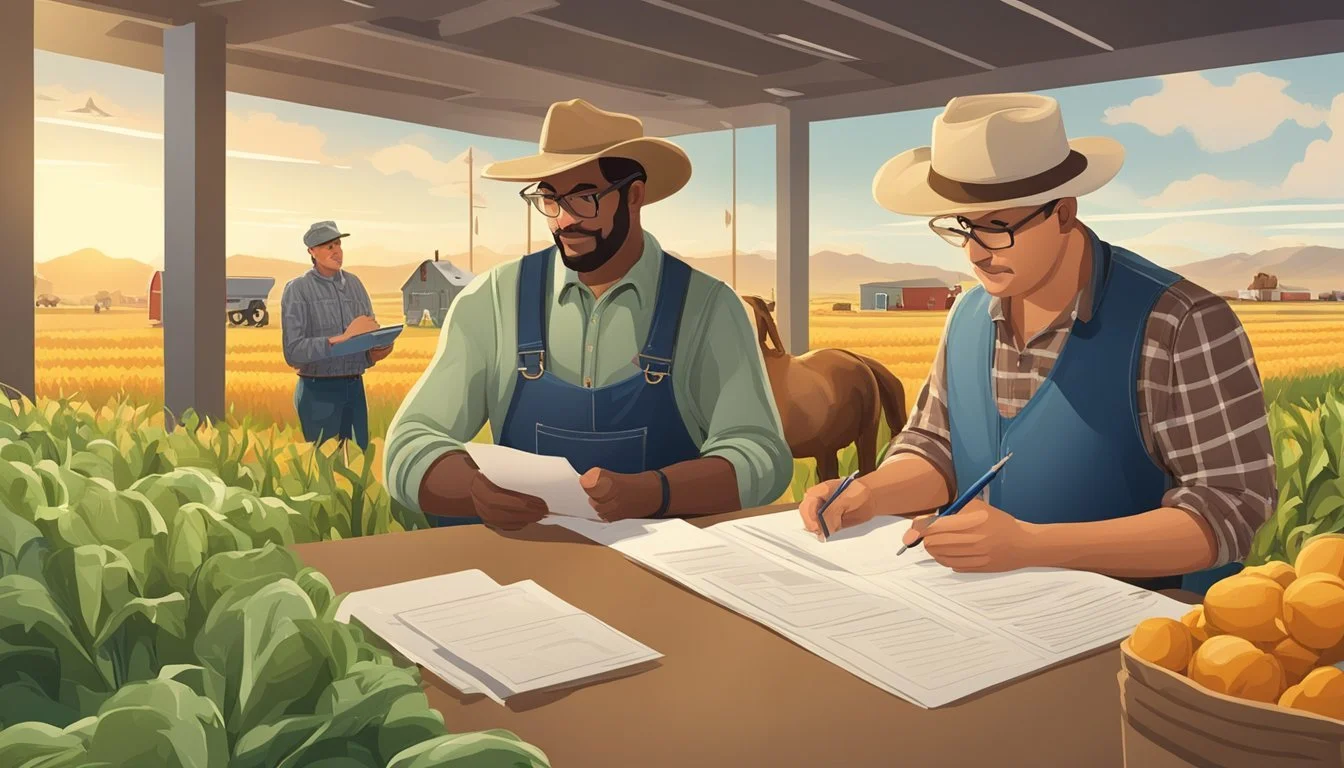Farm Loans in Nevada
A Guide to Your Best Options
This Article is Part of Our Guide on Farm Loans for All 50 U.S. States
Nevada, with its diverse geography and climate, presents unique opportunities and challenges for the agriculture industry. Farm loans have become a vital tool for Nevada farmers and ranchers seeking to start, expand, or sustain their agricultural business. Financial services tailored to the agricultural sector are crucial, and in Nevada, there are various options for secured financing available both from government and private lenders. These loans are designed to address the needs of the state's agricultural producers by offering competitive interest rates and terms that accommodate the cyclical nature of the farming industry.
The agricultural landscape of Nevada is supported by institutions like Farm Credit which offer reliable credit services, helping to bolster rural communities and the overall agricultural economy. In addition to private financial services, the USDA Farm Service Agency (FSA) plays a significant role in providing governmental assistance. The FSA administers farm loan programs in the state, which includes offering loans for farm ownership and operations, with the aim of assisting farmers and ranchers in achieving their financial objectives. These financial tools are essential in maintaining the vitality of Nevada’s farming and ranching operations, contributing to a major segment of the state's economy.
Understanding Farm Loans
Farm loans in Nevada are essential for farmers and ranchers seeking to finance their agricultural operations. They offer the financial means to purchase land, equipment, livestock, and cover other necessary expenses.
Definitions and Basics
Fundamentally, a farm loan is a line of credit specifically intended to meet the unique needs of the agricultural sector. Farm loans serve to finance the operational requirements of farms and ranches, allowing for the purchase of assets and covering operating costs. The Farm Service Agency (FSA) categorizes farm loans into two primary components: farm ownership loans and operating loans.
Farm Ownership Loans: Designed to assist farmers in purchasing land or expand their existing properties.
Operating Loans: Aimed at helping farmers cover the costs associated with day-to-day farm operations such as seeds, equipment, livestock, and feed.
Types of Farm Loans
There are several loan options available for agricultural financing that cater to different aspects of farming:
Direct Farm Ownership Loans: These are loans provided directly by the FSA to purchase farmland or construct or improve facilities.
Guaranteed Farm Ownership Loans: Unlike direct loans, these loans involve a lender and are guaranteed by the FSA, offering higher borrowing limits.
Conservation Reserve Program (CRP) Loans: Specifically designed to encourage farmers to convert agricultural land to conservation purposes.
In Nevada, eligible applicants may obtain direct loans up to $300,000, while guaranteed loan limits can be adjusted annually for inflation.
Key Players and Lenders
The primary provider of farm loans is the Farm Service Agency, a branch of the United States Department of Agriculture (USDA), but private financial agencies also play a significant role. Key players in Nevada include:
American Farm Financing: A private entity offering financial solutions to Nevada's farmers and ranchers.
Farm Plus Financial: Another private firm that specializes in helping farmers secure loans for purchasing agricultural land and refinancing existing debt.
In addition to federal programs and private lenders, there are also state-specific programs and local credit unions that offer agricultural loans tailored to Nevada's specific farming requirements. These key players work collaboratively to provide a comprehensive array of financing options to Nevada's agricultural community.
Eligibility and Requirements
Farm loans are essential tools that enable Nevada's farmers and ranchers to initiate, sustain, or expand their agricultural operations. These loans are contingent upon meeting specific credit and operational prerequisites, ensuring that only qualified farmers and ranchers receive support.
Credit Requirements
To be considered for a farm loan in Nevada, applicants must demonstrate a reasonable credit history. The USDA does not expect perfection, but applicants should exhibit an ability to honor obligations. For both farm ownership loans and operating loans, the following credit stipulations are typically enforced:
No Federal or State Convictions: Applicants must have no federal or state convictions for planting, cultivating, growing, producing, harvesting, storing, trafficking, or possession of controlled substances.
Repayment Ability: They must show the ability to repay the loan on time from the income of the farming or ranching operation.
To give an example, the Farm Service Agency (FSA) offers up to $600,000 for farm ownership loans to eligible borrowers, provided they adhere to these credit demands.
Operational Requirements
Criteria for operational requirements revolve around the sustainability and feasibility of the agricultural enterprise. When considering operating loans or farm ownership loans, the following must be satisfied:
Experience and Tenure: An applicant ideally should not have operated a farm or ranch for more than 10 years to qualify for certain programs aimed at beginning farmers.
Ownership Proportions: A potential borrower must not own a farm or ranch that exceeds 30 percent of the average size farm in the county, as established by the latest Census for Agriculture.
For instance, a beginning farmer is one who usually meets the stipulated operational requirements, including being in the business for less than 10 years and complying with the farm size eligibility.
Loan Terms and Rates
Farm loans in Nevada offer a variety of terms and rates to meet the specific financial needs of the agricultural community. They provide essential capital for start-up costs, expansion, and maintenance of farming operations.
Interest Rates
The interest rate for direct farm ownership loans is typically set at a fixed rate. As reported, the Farm Ownership Loans (Direct) have an interest rate of 3.750%. Joint financing options present even more competitive rates, for example, the Farm Ownership Loans (Direct, Joint Financing) is at 2.500%, and there is a special Down Payment program with rates as low as 1.500%. Private lenders, such as Farm Plus Financial, offer financing with rates contingent on factors like market conditions and creditworthiness. These lenders align their loan rates with indices such as the 5 Year Treasury note rate, in some cases adding 5.5% to the base rate.
Repayment Terms
The repayment terms for farm loans vary depending on the type of loan and lender. The USDA Farm Service Agency provides loans with maximum terms up to 40 years, ensuring that borrowers can maintain manageable annual payments. Private lenders often have different repayment options, ranging from short-term loans with higher payments to long-term financing with lower annual costs. Some allow for loan amounts to be adjusted up to $25,000,000, thus offering significant flexibility to large-scale agricultural businesses in Nevada.
Loan Application Process
Before applying for a farm loan in Nevada, it is essential for applicants to thoroughly prepare their financial documentation and understand any potential closing costs associated with the loan process. These initial steps are crucial for a seamless application experience.
Documenting Your Farm's Finances
Applicants must demonstrate their farm's financial health. They should gather all financial records, including:
Income Statements: Annual summaries of farm income and expenses.
Balance Sheets: Details of assets, liabilities, and equity to showcase financial position.
Cash Flow Projections: Estimates of future cash income and expenditures.
The USDA Farm Service Agency's Loan Assistance Tool is a valuable resource for applicants to review various loan types and verify their eligibility. Completing the required paperwork with accuracy and providing comprehensive loan information is integral to the loan application's success.
Understanding Closing Costs
Closing costs are an array of additional expenses that come with obtaining a loan, beyond the principal and interest. Applicants can expect to cover:
Appraisal Fees: For assessing the value of collateral property.
Title Searches: To confirm the legal ownership of the property.
Loan Origination Fees: Charged by lenders to cover the costs of processing the loan application.
The applicants should request a detailed estimate of closing costs early in the application process to ensure they have adequate finances to cover all aspects of acquiring their farm loan.
Financial Management and Loan Utilization
Effective financial management and strategic loan utilization are critical for maintaining a healthy agricultural business in Nevada. Farmers must navigate operating costs while investing in the growth and sustainability of their farmland.
Operating Costs and Farm Management
Agricultural operations in Nevada encounter a variety of operating costs. These include expenses for seeds, fertilizers, irrigation, machinery maintenance, and labor. Farm operating loans provide the necessary capital for farmers to manage these expenses efficiently. By securing these loans, farmers can maintain cash flow throughout the season, ensuring that operational needs are met without disrupting the farm's financial stability.
Investing in Farm Growth
Farmland in Nevada represents a significant investment, and farmers often seek to expand their operations to remain competitive. Utilizing loans for farm growth allows for actions such as acquiring additional acres, constructing new facilities, or upgrading existing infrastructure. With strategically acquired operating loans, farmers can invest in practices that conserve soil and water resources, which contribute to long-term agricultural success. Access to funds through loans is a lever that farmers can utilize to sustain and expand their operations thoughtfully and responsibly.
Specialized Loan Programs
In Nevada, farmers have access to a variety of specialized loan programs designed to cater to specific needs, such as starting a small operation or overcoming unforeseen challenges.
Microloans and Youth Loans
Microloans are streamlined loan programs to assist small or beginning farmers, niche and non-traditional farm operations, and growing operations in urgent need of financial services. They are tailored for operations with smaller-scale financing needs, with a maximum loan amount of $50,000.
Features of Microloans:
Simplified application process
Lower down payment
Shorter processing times
Youth Loans are intended for young individuals participating in 4-H clubs, FFA, or a similar organization, aiming to finance their agricultural projects. An applicant must be between the ages of 10 and 20 years, and the maximum loan amount is $5,000.
Requirements for Youth Loans:
Demonstrate a project supervised by an advisor
A plan showing how they can repay the loan
Involved in a community-based project
Emergency and Conservation Loans
Emergency Loans (EM) are available for farmers who have suffered physical or production losses due to natural disasters or quarantine. These loans help producers restore or replace essential property, cover all or part of production costs associated with the disaster year, pay essential family living expenses, reorganize the farming operation, and refinance certain debts.
Criteria for Emergency Loans:
Existence of a declared disaster area
Experienced a production loss of at least 30%
Securing credit elsewhere
Conservation Loans (CL) support farmers aiming to implement conservation measures on their land, which enhance natural resources or improve on-farm energy efficiency. Conservation practices could include installing conservation structures or creating organic agricultural systems.
Advantages of Conservation Loans:
Encourage environmental stewardship
Promote sustainable practices
Long-term investment in land health
Loan Support for Diverse Agriculture
In Nevada, the agricultural sector benefits from various loan programs designed to support a wide array of farming activities, from traditional livestock and crop production to non-traditional and specialty operations. These loans cater to the purchasing needs for seed, equipment, and livestock, as well as the development and expansion of diverse agricultural commodities.
Supporting Livestock and Crops
Loans available to Nevada farmers provide crucial financial support for livestock, including cattle and calves, as well as crop cultivation covering staples such as potatoes, alfalfa, barley, and oats. These loans are structured to assist with:
Livestock: Acquisition and care of dairy and beef cattle, including breeding stock and feeder calves.
Crops: Purchase of seed and equipment necessary for planting, harvesting, and producing key agricultural commodities.
Lending programs are tailored to ensure farmers have access to the capital required to sustain and grow their traditional agricultural enterprises in a highly competitive market.
Aid for Non-Traditional Farming
In addition to standard agricultural practices, Nevada's loan programs extend to non-traditional and specialty operations that diverge from typical farming models. This support includes:
Specialty Operations: Economic assistance for farmers engaging in the cultivation of organic produce or hydroponic vegetation.
Innovative Agriculture: Loans that facilitate the implementation of advanced agricultural technologies and practices.
These financial tools empower farmers and ranchers who are diversifying into niche markets or adopting innovative methods to stay ahead in the dynamic agricultural landscape.
State Specifics in Nevada
Nevada offers specific programs and adaptations for farming enterprises, considering its unique topography and the crucial role agriculture plays in its economy. The state provides resources to support agricultural success and addresses the challenges posed by the local landscape.
Nevada Department of Agriculture Services
The Nevada Department of Agriculture (NDA) offers a wealth of services to support the agricultural community. Among these services, the NDA provides financial assistance through loan programs aimed at advancing rural communities. They play a critical role in facilitating farm operations across the state, ensuring that farmers and ranchers have the capital needed to manage and grow their businesses. With the understanding that Nevada's terrain can be challenging, these services are designed to bolster the agricultural sector that is a cornerstone of the state's economy.
Adapting to Nevada's Geography
Nevada's geography is characterized by its mountainous regions and vast desert terrains. Farmers and ranchers must adapt their practices to the state's unique environment. They use innovative water management techniques to cope with the arid climate and develop soil conservation methods to prevent erosion in mountainous areas. These adaptations are essential as they allow Nevada's 3,400 farm operations to thrive over more than 6.1 million acres of land, which mainly consist of alfalfa hay, alfalfa seed, potatoes, and other crops capable of flourishing in the Silver State’s distinct landscape.
Exploring Additional Financing Options
Farmers and ranchers in Nevada seeking to grow their operations have several financing avenues at their disposal beyond traditional loans. This includes specific packages for land acquisition as well as flexible refinancing options that can provide a vital lifeline during transitional periods.
Land Loans and Property Acquisition
When it comes to expanding one's agricultural operations, securing land loans is a quintessential step. These loans are tailored for the purchase of new property and can be pivotal for both seasoned and beginning farmers. Property acquisition in Nevada might involve competitive interest rates and various term structures to match the borrower's financial capabilities.
Land Development Loans: Ideal for preparing raw land for cultivation.
Backed Line of Credit: Offers ongoing access to funds based on land equity.
Refinancing and Bridge Loans
Farmers often seek refinancing options to improve their operation's financial health, whether it's to secure a lower interest rate or to alter the loan term to better match cash flows. Bridge loans, on the other hand, serve as a short-term solution to cover immediate financial needs while awaiting a more permanent financing situation.
Refinance Loans:
Potentially lower monthly payments.
Restructure existing debt for improved financial management.
Bridge Loans:
Quick access to cash.
Allows farmers to take immediate action on time-sensitive opportunities.
Additional Resources and Support Systems
Farmers in Nevada have access to a variety of additional resources and support systems designed to assist with financial management, land conservation, and educational opportunities. These resources provide invaluable assistance through agencies and educational programs.
Agencies and Online Tools
Farm Service Agency (FSA): The FSA offers programs such as the Conservation Reserve Program (CRP) which helps agricultural producers safeguard environmentally sensitive land by planting long-term, resource-conserving covers. This enhances not only water quality and soil erosion control but also wildlife habitats.
Farmers.gov: This online portal serves as a one-stop-shop for resources from the USDA, including the Farm Loan Discovery Tool which aids producers in identifying the types of loans that may suit their business needs.
Farm Loan Programs: Producers facing financial risk may receive additional automatic financial assistance, as part of the aid package provided through legislation.
Farm Storage Facility Loan: This loan provides low-interest financing so producers can build or upgrade storage facilities for eligible commodities.
Marketing Assistance Loans: These loans offer producers interim financing at harvest time to meet cash flow needs without having to sell their commodities when market prices are typically at harvest-time lows.
Community and Educational Programs
4-H Clubs: These local clubs provide youth with hands-on educational programs, where they learn about agriculture, science, and more, fostering the next generation of Nevada farmers.
Future Farmers of America (FFA): FFA is another critical organization that supports students interested in pursuing careers in agriculture. It offers leadership training and helps students apply practical agricultural knowledge in real-world scenarios.
Both 4-H Clubs and FFA are instrumental in shaping the agricultural leaders of tomorrow by providing vital community support and fostering essential skills.
Conclusion
In Nevada, the agriculture sector benefits greatly from the availability of various farm loan options. These loans are designed to support farmers in starting, expanding, or maintaining their agricultural operations. Farm Plus Financial and American Farm Financing are resources that offer comprehensive loan processes and competitive rates.
Farmers seeking assistance can obtain financing tailored to the unique demands of their business through entities like AG Lending Group and Conterra Ag Capital. These institutions understand the intricate nature of farming and ranching in Nevada and provide solutions that encompass both farm and ranch loans, as well as agribusiness loans.
With loan amounts beginning from $400,000 and extending up to $25,000,000, financial support is accessible for a wide range of needs within the state. It is noteworthy that institutions like the USDA Farm Service Agency also contribute with programs that extend beyond direct loans and encompass conservation efforts, water loan programs, and grazing on national forest system lands.
The assistance through these various programs underscores a commitment to the growth and sustainability of agriculture in Nevada. Prospective borrowers are encouraged to reach out to knowledgeable staff across these financial institutions who are prepared to aid in navigating the loan application process, ensuring that financial decisions are made confidently and with the best terms available.












